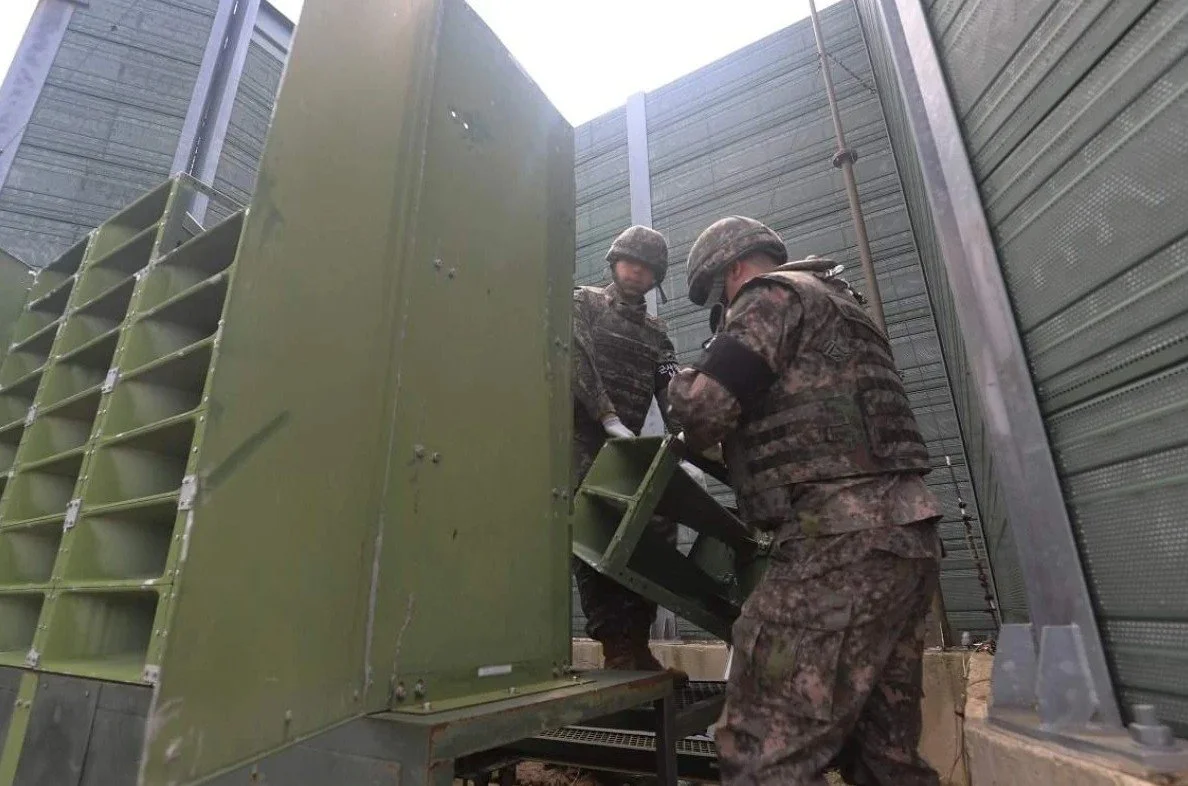A view of North Korea from Ganghwa Peace Observatory in South Korea
When our team visited South Korea this June, we stood near the Demilitarized Zone (“DMZ”) and heard firsthand the unsettling, and strange noises that North Korea projected across the border. The haunting sounds that pierced the air, which had been replaying for several months, left an indelible impression on us. Local residents also described the broadcasts with unnerving clarity: as Ahn Hyo-chul put it, “sometimes sounding like a siren, sometimes like a ghost, sometimes like animal cries. Our grandchildren say it sounds like wolves from North Korea,” while another resident, Kim Wan-shik, likened them to “car brakes tearing noises and metal grinding,” calling the sound “extremely irritating,” especially at night, which has left many residents exhausted.
For decades, the DMZ has been more than a physical boundary — it has served as a psychological battlefield. Through high-powered loudspeakers positioned along the border, both Koreas waged a long-standing campaign of sound, filled with propaganda, music and political messages. Earlier this month, South Korea quietly dismantled approximately 20 of its front-line loudspeaker systems along the 250km border, and North Korea reportedly followed suit without a formal agreement or coordinated announcement. This unexpected silence has drawn international attention and raised questions about its meaning for inter-Korean relations going forward.
LOUD SPEAKERS THAT CHANGED LIVES
Historically, South Korea’s broadcasts included K-pop music, uncensored international news, and appeals to North Korean soldiers and citizens – content that directly contradicted the propaganda of the North. These broadcasts were suspended in 2018 following the Panmunjom Declaration but were revived in 2024 as relations deteriorated.
Though often dismissed by North Korea as mere noise, these broadcasts in fact held far greater weight for those within earshot. For North Koreans living or stationed near the border, the messages coming through the loudspeakers were sometimes their first and only exposure to a world beyond the regime’s control. Former South Korean President Park Geun-hye once described these broadcasts as “the most effective form of psychological warfare,” crediting them with encouraging defections and challenging the ideological walls erected by the North Korean regime. Defectors who fled their homeland have backed up this statement. The content, though simple on the surface, often planted the seeds of doubt in listeners, encouraging them to question and, eventually, to act. For instance, at least two North Korean soldiers had reportedly defected in 2017 after hearing the broadcasts and were drawn, in part, by the unsettling realization that the truth they had known was incomplete, or worse, constructed.
A QUIET THAT SPEAKS VOLUMES
Photo: South Korea’s Defence Ministry
The decision to take down propaganda loudspeakers followed South Korean President Lee Jae-myung’s directive to restore parts of the 2018 inter-Korean military agreement to reduce border tensions, which had been suspended amid rising tensions in prior years. According to South Korea's Ministry of National Defense, the dismantling was completed by August 6, and was intended to signal a willingness to rebuild trust and revive dialogue with Pyongyang.
While South Korea acted unilaterally, multiple reports from media outlets indicated that North Korean soldiers were also seen removing speakers near the DMZ around the same time. Despite these peaceful appearances, North Korea’s regime has publicly rejected any suggestion of reciprocation or thaw in relations. In a strongly-worded statement issued on August 13, Kim Yo-jong, the sister of North Korean leader Kim Jong-un and a key voice on inter-Korean affairs, stated unequivocally that North Korea had “never removed loudspeakers installed on the border area and are not willing to remove them.” She criticized Seoul’s dismantling of its own broadcasts as a misleading gesture, labelling it an attempt to manipulate public sentiment. Kim further dismissed South Korea’s interpretation of any such action as a “pipedream,” and rebuffed calls for dialogue by stressing that any speculation regarding engagement with Seoul or Washington is without foundation.
It may be short lived, but the silence along parts of the heavily militarized border is a welcomed break. Even though the North has rejected any notion of reconciliation, the South’s dismantling of loudspeakers along the Korean border has brought a long-waited feeling of peace to a region defined by tension and psychological warfare.




